Text
Goodbye, Chicago

Goodbye, Chicago.
It’s been a while now, but it’s time for me to go. I’ll be back again some day. Maybe when there are blue skies and sun and long days on the beach that turn into long nights at a bar with all the windows open. Maybe, like the I left you, it’ll be cold and rainy, maybe the third or fourth day where there is no sun—and maybe it won’t matter at all because I’ll be back in you and that’s good enough, even if it’s gloomy outside.
Goodbye, Kerry, my first friend in the city. Goodbye, Diane, my first bartender there. You died too early, and if I ever hear the bells of St. Matthias ring again, I’ll think of you. Goodbye, Spyner’s, Ricochet’s, The Goat, Margaret’s, The Lighthouse, The Oasis, the bar at 67th and Cottage Grove where I met Steve and Gloria.
Goodbye, Freddy. Whenever I file a FOIA request with CPD, I’ll think of you.
Goodbye, John. The one who started many of us down the path of watching the other hand at the Chicago Police Department.
Goodbye, Mike. I’ll never forget the first day we met at the Rainbo Club, and I knew I’d met a kindred soul.
Goodbye, Pap.
Goodbye, Pastor Brooks.
Goodbye, Lorenzo. If it weren’t for you we would know less about Chicago police killings than we now do. Thank you.
Goodbye, Sandra Bland.
Goodbye, Warren and DeSean and all the others. Yours were Chicago stories, and I won’t soon forget them.
Goodbye, Rahm. Being a reporter means there’s often so much more you know about a story than you can rightfully print. I know a thing or two about you, and what you knew, and I won’t soon forget that, either.
Goodbye, Brian, and all of the other forgotten dead of Chicago. Your lives meant something, even if they sometimes didn’t get the attention they deserved.
Bye Anita.
Goodbye, protesters. You were the only ones who shut down Trump. For better or worse, that’s part of the Chicago Way.
Goodbye, Cook County Jail. You are home to Chicago’s worst and some of its best, a place where the sins of our past and present take human form and crowd the halls. I hope you get better one day. I hope all of Chicago does.
Goodbye, Officer Bertetto. You represent the best of the Chicago Police Department. You bring hope to the people and places you come across, you bring light into dark gangways that swallow men whole. I hope you don’t ever stop doing what you’re doing, because this city needs you. I know it can be difficult at times, but hopefully one day this city can pay off its debts to you and officers like you who make us all safer, better.
Goodbye, Nisei. Goodbye, Kenny Kuzuharu, looking down on us from beyond this world. Goodbye, Pat, Dave, Lou, Doug, Devyn, Meri, Wyl, Phil, Lance, and those faces from my side of the bar that have no names, just banter. When I needed a safe haven amongst the insanity of Wrigleyville when it was consumed by the explosion of emotion that had been building for 108 years, you were there. I won’t forget that. And I won’t ever come back to this city without seeing you.
Goodbye, Wrigley. I will never be far away. I can’t be, because I can close my eyes and see and feel you. On June days when the sun shines on me wherever I am, I will think of you and how you’ve always been there. When the weather turns and I know the first autumn winds are whipping around your corners, I will think of John Lackey warming up ahead of Game 4. When my dad and I and 40,000 others sang Low Places and were filled with joy and anticipation, only to be reminded that baseball is designed to break your heart, and on that night it did.
On slow nights on the cops shift in Peoria I dreamt of Chicago. On frozen nights in northern Minnesota and North Dakota I let my imagination play with the thought of living, working and becoming a part of this incredible city. Somehow, I made it happen. It hasn’t always been easy here—I don’t think the city is designed to allow that to happen—but it’s always been rewarding.
Thank you, Chicago, for making me tougher, smarter, stronger, more human, more real. I know it will serve me well in my new home in Texas, and wherever I go from here.
2 notes
·
View notes
Text
Trump’s typos indicate a careless presidency
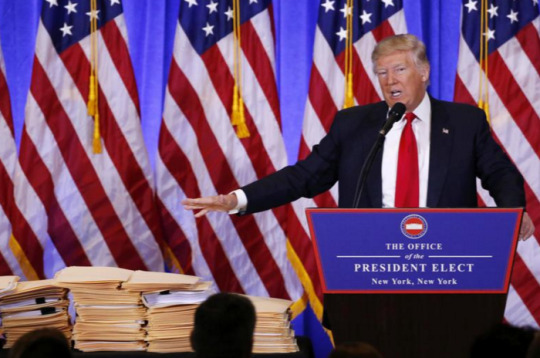
On Saturday, Donald Trump accused former President Obama of wiretapping him during the campaign. Perhaps you heard about it.
When I read the tweets I was, of course, thinking how insane they were. If Trump was wiretapped, it would have been a FISA court that ordered it—and it would have done so under the suspicion that Trump had “committed a serious crime or was an agent of a foreign power,” The New York Times reported.
“How low has President Obama gone to tapp my phones during the very sacred election process,” Trump asked without a question mark. “This is Nixon/Watergate. Bad (or sick) guy!”
The brazenness of the charge is shocking—as are most of Trump’s unsubstantiated allegations. The fact that it contained an obvious typo is not.
More than a day later later, as the tweet still stares back at me from the glowing void of the Internet that allows for the President’s every thought accompanied by his tenuous grasp of the English language to be transmitted directly into my tired eyeballs, I wonder why it still says “tapp.”
No correction. No deleting the tweet and replacing it with a new one that correctly spells tap. Just “tapp,” sitting there, boring a hole into my frontal lobe with its glaring stupidity or stubbornness, depending on what you choose to believe. Our President, I have thought many times over the past 30 hours, either cannot spell the word “tap” or refuses to correct a mistake.
Each morning, I along with tens of thousands of journalists and about 24 percent of American adults log onto Twitter. Many of us go to Trump’s page to see what the president has said the night before or hours before most people have woken up. Sometimes he’ll promote an upcoming television appearance. Often, the president will critique media that is not friendly to him. Sometimes, like yesterday, Trump will launch a baseless attack against a foe that has little or no evidence behind it, sending aides scrambling to explain the president’s allegation and news organizations into their familiar, daily mode of debunking a presidential falsehood.
No matter what he says, Trump’s tweets usually contain a typo.
On Friday it was “hereby,” which Trump misspelled twice before getting it right.
“I hear by,” he said at first, before thinking better of it.
“I hearby,” he tried again.
Finally, “I hereby demand a second investigation, after Schumer, of Pelosi and her close ties to Russia, and lying about it,” the president said in a sentence of questionable grammatical effectiveness. (Her close ties, should they exist, are plural and should therefore be referred to as “them,” and not “it.”)
For most Trump supporters—and probably for most Americans—none of this matters. With the vast majority of Americans not even on Twitter, most people view this media echo chamber in which journalists spent a disgusting amount of their time like they would any other place they don’t frequent: not too important.
But to journalists, Twitter is our home and language our currency. We understand the power of words because we deal in them each day—which is why we’re not the only ones who are taken aback when the Leader of the Free World uses Twitter to speak openly and freely and, in the minds of many, irresponsibly.
We also understand, as people who write not only to make a living but to inform our fellow citizens of news, make arguments, explain the sometimes confusing mechanisms of government and ask specific questions of those in power, that spelling words correctly and using language with precision is important to achieve success in any of those realms.
So, to watch a man bludgeon the English language each day and see few consequences for it is maddening.
I imagine many people would say Trump’s typos are simply mistakes. But this can’t be true. Because when something is done consistently—whether it’s striking out on high fastballs or not using your turn signal—the pattern shows that the action is more than a mental lapse. It is something that has been learned and can be unlearned, in those two examples. For Trump, to fix the problem would require learning, which is another reason that his poor grammar is so bewildering to journalists: how can someone who has achieved so much in life, who has made tens of millions of dollars, who has become the President of the United States, not know how to spell “tap” or be too stubborn to make a simple correction? (Don’t tell me he doesn’t have time; Trump watches six hours of TV a day and plays at least a round of golf almost every weekend. Plus, he has fixed tweets before.)
I can’t tell you why Trump doesn’t care to make a correction, but I can say for certain that he has had enough issues with the English language to suggest that his errors are more than mistakes made in the heat of the moment. He has consistently misspelled words on his Twitter account—my personal favorite is “unpresidented,” a hilarious misspelling as well as the possible subject of a lengthy psychotherapy session.
Google “Donald Trump typo” and more than a half million results come up. Hit the News icon and there’s usually an article from a few hours ago. On Saturday afternoon, it was a Politico piece noting that it isn’t just Trump who struggles with spelling and grammar, but his entire Administration.
The article notes several recent errors on the part of Trump’s White House—the most simplistic of which appears to be the old to/too mix-up, a mistake that prompted the Library of Congress to remove from its website a pre-Inauguration poster created by the Administration that had been for sale. (The best part: the poster managed to get the spelling right the first time around. “No dream is too big, no challenge to great,” it read.)
And right there, the little red squiggly line just showed up under “to,” as I wrote. Most phones don’t even tell you that you’ve just spelled something incorrectly, instead automatically correcting the mistake. So how is it that a White House document listing terrorist attacks that supposedly weren’t covered by the media (they all were) contained the non-existent word “attaker” 27 times? How can the president, typing on the Android phone we all know he uses for his personal tweets, misspell “honored” as “honered”?
If you consider this nitpicking, fine. But think of how you would feel if you were the attorney general of American Samoa traveling to the White House only to learn that your territory had been identified in an official document released to the press as “American Sonoma.”
One person told me that perhaps Trump should be considered an “idea man,” someone whose overall plans and ideas are what makes him a success, and that it’s up to others underneath him to sort out the details. That’s understandable; idea men can get a lot done and can prompt great change. But that’s why they have handlers. That’s why they have people who filter their ideas through sober-minded reasoning, detailed planning and careful implementation.
At times during Trump’s first weeks in office, his aides have been successful at reining him in, but his tweets show that he continues to act without the filter of the more cautious minds around him. (Forget about typos momentarily and consider that Trump may have accused Obama of a crime yesterday with tweets that White House aides did not know were coming until they woke up and saw them on their phones.) It’s also possible that Trump, not a fan of criticism of any kind, is ignoring his phone’s suggestion that he properly spell some words. I think what’s most likely, though, is that the president simply doesn’t care to go back and fix a simple mistake.
This should tell you everything you need to know about the man we have chosen to run our country.
2 notes
·
View notes
Text
It’s not time to sit down
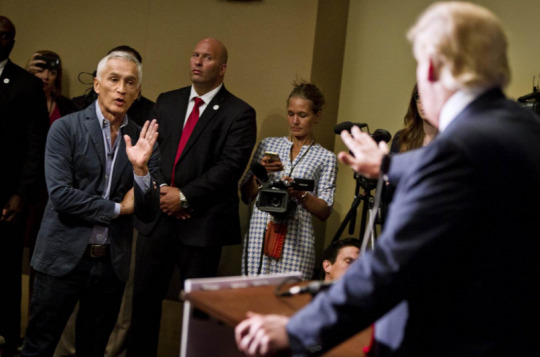
It doesn’t take spine to do what Donald Trump did. It takes disrespect.
When the president declared the media to be the “enemy of the American people,” it didn’t upset me as much as it made me smirk. Ok, big boy. You’ve had your say. We’re going to go back to work now, so you just let us know when you want to talk.
What did enrage me, however, was watching Trump shout down reporters at his first press conference as president last week. How can someone who has earned so much and won such a decisive victory still be so insecure that he has to tell people to “sit down” simply because they’re asking questions at a press conference?
I had another thought: Who are you to talk to people like that? Just because you’re the president, we’re just supposed to sit here and take it? Donald Trump is bludgeoning decorum and democratic tradition each time he steps in front of a microphone. He believes respect is something that should be automatically granted to him because he is president, but he shows no respect for the office itself—and yet we continue to play the same, respectful game.
I think that should change. I think it’s time to stop sitting down when the president says to.
My first full-time reporting job was in Bemidji, Minnesota, and it didn’t take long for me to realize that I was operating at a different speed than some in power structures there. Law enforcement was especially wary of me and averse to my style of reporting. It wasn’t so much that I was ever told to “sit down” as it was that I got the impression not to go certain places, ask certain questions, or seek certain information.
After all, the town and the county had survived for quite some time before I arrived to ask questions of the police chief, the sheriff and others. It’d be just fine, then, if all my questions went unanswered, if I didn’t get all the information I was seeking, or if I spent six hours at a fatal police standoff without being granted a single comment from law enforcement. That last one pissed me off a bit—everyone in the area was talking about the standoff all day, it shut down traffic on a busy county road for hours and the police presence was enormous—and yet no one in law enforcement would answer basic questions about what was going on.
So I did what any reporter would do: I talked with family and friends who told me as much as they were willing about what happened to Miquell Deppa that day. What you’re seeing coming out of the White House now is not too dissimilar a situation. Trump and his team are more than just skeptical of the mainstream press; they are outright hostile toward them. The White House doesn’t believe it will ever get fair coverage so it sees no advantage in playing a respectful game. As such, questions go unanswered, issues go undiscussed and reporters start finding their own way into stories. In the case of Trump, that has ended up coming in the form of leaks. (This is just one part of the explanation for the leaks that have emerged in the first month of Trump’s presidency. Others include staffers concerned with Trump’s ability to govern and those who are trying to secure a future for themselves if and when Trump’s presidency ends in disaster.)
The Trump White House is stepping on our necks, which shouldn’t come as a surprise to anyone who paid even a small amount of attention to his campaign. And yet there we were, sitting politely in the East Room as Trump dressed us down as enemies of the state and downright awful, lying people who want to screw over hard-working Americans with our liberal agendas and unpatriotic thoughts.
And we took it. We allowed Trump to tell a Jewish reporter to “sit down” without even pressing the president on the reporter’s question. Trump was upset because he thought the reporter was accusing him of anti-Semitism—which wasn’t the case at all. Instead, the reporter simply wanted Trump’s response to the rise in anti-Semitism that has cropped up since he took office. Trump, too impatient to listen to the actual question and instead jumping to the conclusion that he was being accused of anti-Semitism, acted as any child would when confronted with something uncomfortable or scary.
“Quiet, quiet,” he said. “Sit down.”
It wasn’t a “simple question,” Trump complained. The reporter physically sat down. Others that day allowed their questions to be cut off by Trump, who would go on to give half-truths and outright false statements in response to queries from the press.
But it hasn’t always been this way.
***
Jorge Ramos was the last reporter who refused to sit down. Now that we know Trump will act in the same immature manner as president as he did when Ramos was escorted from an August press conference, the Univision reporter’s actions should provide a blueprint for any journalist confronted by Trump’s impulsive anger.
youtube
I’m not sure what Ramos planned on asking Trump that day, but it doesn’t really matter. The point is that Trump knew it wasn’t going to be a friendly question, so he shut it down with brute force. That was step one. Step two came on Friday when he went from shutting down adversarial reporters with childish bullying to accusing them of treason, saying in a tweet that the media is the “enemy of the American people.”
“That’s how dictators get started,” John McCain said of Trump’s comments today on Meet the Press.
In addition to acting like a dictator, Trump is acting like something we have a very simple word for here in the Midwest, something I’m sure he’s been called many times.
Trump doesn’t respect anyone who disagrees with him—which in his case is much of the country, the entire Democratic Party and, in his paranoid mind, all of the mainstream American media. Not only is this not true—the media just wants very important questions answered on a variety of fronts—it is insane. Trump suffers from a persecution complex, and that was made apparent by the minute in his hour-long press conference last week in which he repeatedly sought out “nice questions” from “friendly reporters.”
That’s not the way it works. Respect is earned, and so far Trump has shown none for anyone other than himself, his family, or those who grovel at his feet. So why shouldn’t the media respond in kind?
As San Antonio Spurs coach and outspoken Trump critic Gregg Popovich noted after the inauguration, “there’s a difference between respecting the office and the person who occupies it.”
When the president acts like a petulant toddler—telling reporters to be quiet and to sit down—we should refuse to do so, even if it means being escorted out of the room. The president and his team already view the media as “the opposition,” so how much additional harm can be done by refusing to be bullied?
No Trump supporter will gain respect for or trust in the media by watching us tuck tail and run. They may not have more trust in reporters if we refuse to sit down and are kicked out of a press briefing, but there’s a chance they’ll view us less as cowards.
3 notes
·
View notes
Text
A bad time for truth
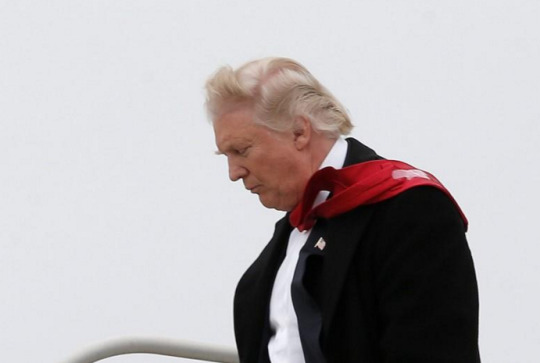
As we approach the end of 2016, things are not looking good on a number of fronts.
First, transparency. Legislators in Texas have proposed changes to the state’s open records law that would prevent anyone from outside the state from receiving documents related to all manner of government business. Tennessee already has such a provision in effect, I was reminded when I tried to get records related to the fatal police shooting of Todd Browning there.
Here’s Melydia Caldwell of the Hamilton County District Attorney’s Office, which investigated Browning’s death, doing a familiar “if such records exist, which I won’t say if they do, we’re not required to give them to you” dance:
“If photos [of the pipe Browning was wielding] do not exist, the Tennessee Open Records Act does not require that photos be produced,” Caldwell told me last week. “TORA applies only to existing records.”
Got that? Moving on.
Texas Agriculture Commissioner Sid Miller doesn’t think he should be held to the same standards as news organizations. This, despite his status as a public official and his sharing of dangerously misleading and outright false articles on his Facebook page, which caters to some 340,000 followers. There was the one about jihadists preparing for war on U.S. soil at a camp just outside Houston which turned out to be absolutely not true. There was the fun little story about President Obama, smiling in a Che Guevera t-shirt in Cuba, that also turned out to be a complete lie. There was also the feel-bad story about a man who had been told to take down his American flag because it offended Muslims.
All of them, complete fiction.
Still, Miller was unfazed when confronted with the truth of his sharing of untruths. In fact, he made his own allegation of fake news.
“Look, you’re trying to make up the news, and not report the news. I don’t appreciate that,” he told the Texas Tribune.
If you can read that sentence knowing that Miller shared those aforementioned obviously false stories and not feel a piercing pain behind your eyeballs, you’re a stronger person than me.
****
Now, to some news news: Journalism is fucked.
The Associated Press announced today that it will lay off 25 members of its global news division. That’s pretty bad, right? Meanwhile, a reporter at Glenn Beck’s The Blaze has been suspended—not fired—after bragging about shooting at ISIS while on assignment in Iraq.
Why does The Blaze have a reporter in Iraq when so many other outlets don’t? Wrap up that answer and send it to me for Christmas.
In other disturbing developments for the Fourth Estate, millennials can’t tell the difference between news stories and advertisements, according to a recent study you can be briefed on here.
The best part? Some of those who partook in the study said the best way for them to tell advertising from a news story was when the ad was labelled “sponsored.” When an advertisement as labeled “advertising,” it was not as easily recognizable as the exact definition of that word.
These are digital natives. Imagine how difficult it is for the average fan of Sid Miller’s Facebook page to distinguish between the two, let alone a demonstrably false “news” story and one reported by a reputable outlet.
****
To politics, where we are still spending a disturbing amount of time having to monitor and report on Donald Trump rallies. He’s already had one today and another is scheduled for tonight. What he apparently doesn’t have time for are daily presidential intelligence briefings. (The president-elect will, however, continue his Apprentice producer duties in his “spare time” once president, Kellyanne Conway said today.)
Trump is receiving one intelligence briefing a week, according to Reuters, and hasn’t requested any information specifically related to Iran or Russia—which was again today accused of playing a major role in hacking efforts during the election.
But Trump apparently doesn’t believe those accusations.
“Trump has continually denied a Russian role in the hacking, despite the overwhelming consensus from private sector cybersecurity firms that investigated the hacks and from the various US government intelligence agencies,” CNN reported.
This year can’t end soon enough, but I don’t hold out much hope that 2017 will be much better for truth.
4 notes
·
View notes
Text
Game 1, finally
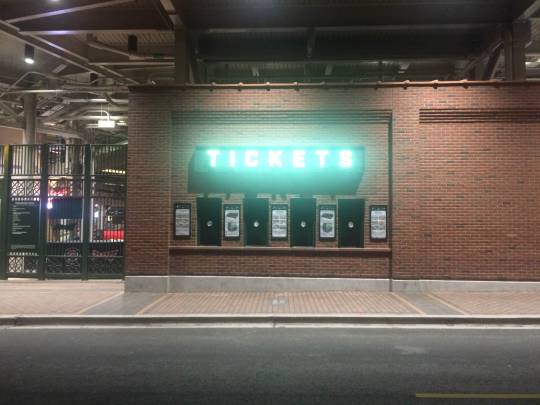
The familiar, grating emergency horn of a Chicago police SUV blares from the alley next to Murphy’s Bleachers. The owner of the tavern, leaning in and talking with a cop, says something into the bullhorn.
“What did he say?” asks Loretta, Murphy’s resident sketch artist who is here eight hours before Game 1 of the NLDS to sell her street portraits for five dollars a piece. The owner had said something to her, messing with her, and she laughed it off and went back to work trying to hustle up some business.
Since Monday I have been nervously waiting for this day, what I’ll say without a single hyperbolic note is the biggest game day of my life. I’ve been riding my bike around Wrigley during the day on breaks from work. I’ve taken to walking laps around the stadium at night. After a summer on the road I’ve committed myself to staying here in the neighborhood for the run of it. Hopefully it will be a full month’s worth of baseball that leads to… I can’t even say it. I won’t say it. But if it happens it will happen in the first week of November.
Everyone goes home in October, Kerouac wrote. And I’m here, waiting.
I’ve watched this week as the preparations around Wrigley have picked up. A Cat generator the size of a locomotive is near the intersection of Waveland and Clark. Next to it, three semi-trailers for the various TV networks covering these first two games. ESPN and ABC 7 have set up their cameras inside Murphy’s, the owner tells me, to capture the beer-soaked madness there should the W flag fly tonight.
As for what’s going on inside Wrigley Field, the only thing I can tell is that it’s a lot.
“What do they got you guys doing in there?” I asked a laborer the other day.
“Shit, what don’t they have us doing…” he huffed.
They are getting the old gal cleaned up for her biggest dance in a decade, and maybe the biggest dance of her life.
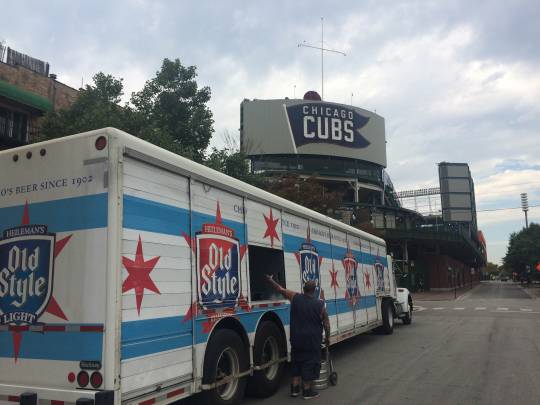
I bummed around the neighborhood the other day with my friend Jeremy Borden, who wrote a story for The Washington Post about all things curse-related. There can be no Cubs postseason appearance without mention of the curse, and as much as Cub fans bemoan the storyline, it is an undeniably fascinating one—a helpless animal, of all things, being used by a showboating tavern owner and sensationalist newspaper reporters to somehow place a cosmic hex on an entire sports franchise.
It seems impossible and unbelievable. But people believe in far stranger things, I have found in this life, if nothing else.
As we walked around the neighborhood, Jeremy asked me what my personal superstitions were when it comes to the Cubs. I don’t have any, I told him. But when strange things happen on the field, I know the way I feel. I know that my mind goes right to a strange, dark place where the supernatural and unbelievable become very possible.

But this team isn’t supposed to have those fears attached to them, that trauma attached to them, we’re told. The neighborhood is changing, the owners have built a from-the-ground-up team of young talent, Wrigley is being revamped. The Cubs are a Winning Organization now, not a duct-taped together combination of aging talent and overpriced free agents. Looking at you, Cubs of 2007 and 2008.
I can say that something about this team feels very different than the teams of those years, and I know I’m not the only one who feels it.
Just before 1 this afternoon I found myself at the only table left inside Murphy’s. The rest of them have been moved in order to pack more people in here for tonight’s game. My nerves are fine, for now. A week’s worth, a season’s worth, and a lifetime’s worth of anticipation, though, promise that I will be a stuttering, pacing mess by the time Jon Lester throws his first pitch tonight.
But Hell, bring it on. I’m ready.
0 notes
Text
People hate the media because we're not out here talking to them: A lesson from Roxboro
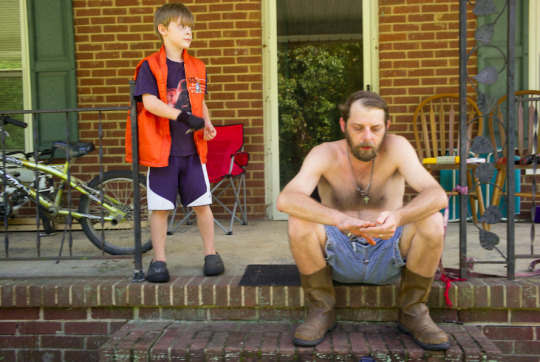
I nursed a Miller Lite in the passenger seat on Tuesday night while my friend, photographer Bill Kotsatos, drove us down a two-lane highway flanked by tobacco fields and pine groves in North Carolina.
The beer was lukewarm from sitting in the car all day as we drove around Roxboro where we working on a story about a 2007 murder. It was celebratory, my imbibing, because yesterday marked the beginning of the end of a story that I’ve been working on for nearly a year. A story that, I hope, will gain the attention of people who can help right what I think is an egregious wrong carried out by the Person County criminal justice system.
But based on what I know about the speed of our news cycle, the attention span of readers and the overall disdain many Americans harbor toward journalists, the story of Quinton Royster, Dominaque Thorpe and Kenneth Sneed will not, to borrow a phrase from my editor, “set the world on fire.”
If 100,000 people read it—an average haul for stories as controversial as I think this one is—I will be happy.
Bill asked me what the point of the story will be and whether or not I will come to a conclusion.
That’s not my job, I told him. My job is to point out problems, not solve them. In this case, two men have been convicted of murder without any physical evidence connecting them to the crime and a third spent three years in jail for obstruction of justice. Add to that an informant who was financially motivated to help the police, and who pointed to Royster and Thorpe as the killers, and you have the makings for a story that should captivate the nation.
Once the problems in this case and others are pointed out, it’s up to those in power—the state’s attorney general, perhaps, an innocence project, or a high-powered lawyer not from rural North Carolina—to fix them.
That's when it hit me: this is why people hate “the media,” a catch-all phrase used to refer to anyone who makes their living by telling other people’s stories and not their own.
“What needs to happen in this country is that the media needs to quit trying to divide us,” said Bradley Humphries outside of his Roxboro home, just hours after I watched Royster plead guilty to the 2007 murder of Steve Yarborough before being taken back to jail. “The media is the biggest problem in this country. The media reports purposefully the stuff that’s gonna cause controversy.”
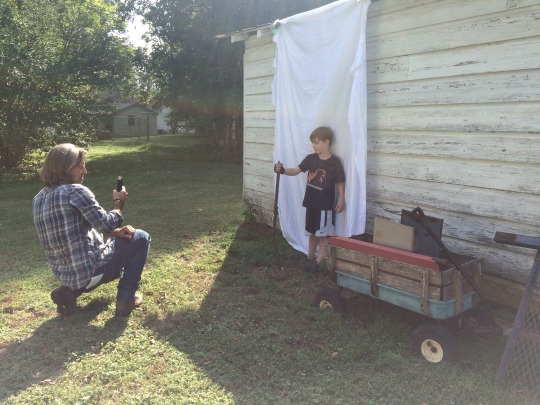
Anyone who has followed this presidential campaign will tell you Bradley isn’t wrong. Anyone who looked on as The New York Times said it “wasn’t clear” that Keith Lamont Scott was holding a gun when he was shot and killed by police in Charlotte will tell you the same thing. What The Times failed to add: it wasn’t clear that he wasn’t.
Bill and I stopped at Bradley’s home on Tuesday afternoon because we wanted to get a sense of this small town, about 150 miles northeast of Charlotte, another community, albeit a much larger one, thrust into a national narrative. On our trips throughout the country, Bill and I stop to talk to people who look like they might have something interesting to say, or who just happen to be outside and appear open to having a conversation. This is the most basic act of journalism, but it’s fading fast as national news outlets become more concentrated on the coasts (and more broke), and local newspapers continue to lay off reporters as advertising money vanishes with each passing quarter. (The job cuts are now hitting digital-only outlets too.)
We are presented, now, with the very real possibility that in 10 or 20 years there will be no reporters to stop and talk with the Bradley Humphries of the country because there will be no money to pay people to do so. With increasingly fewer interactions between Americans and reporters, it’s not surprising that many, like Bradley, distrust the media. I constantly meet people who express such frustrations. Many people have never met a reporter, and when they do, it’s usually because something terrible has happened to them, their family or their community.
Yet we expect people—as we continue to reduce the amount of time we spend away from the coasts, reporting on the feelings, lives, hopes, and dreams of Americans—to trust us, to help us save journalism by adding details to our stories, reading our stories, paying for our stories.
As it stands now, those who are paid to tell the stories of other people’s lives only tend to do so when there’s a tragedy or it’s election season. The pop-in-and-see-what-the-folks-are-saying-on-Main-Street brand of journalism is especially popular during election years, but honestly, I feel like I’ve seen less of it this year. Maybe that’s because I spend so much time on Twitter, where every one of the dozens (more than 100, perhaps?) of journalists who follow the candidates around are constantly sending out box score dispatches, distilling important topics down to boring chunks of who said what, who was where, and who is going somewhere else. It's a wonder we don't get cable news chyrons telling us when the candidates use the restroom and for how many flushes.
Not a single one of those exercises, the kind that titillate and oversimplify, results in learning what Bradley Humphries and the 310 million other men and women in this country like him feel and think.
As we spoke with Bradley, he walked around his front yard in jean shorts and cowboy boots and, under the spell of a slow-burning southern afternoon, he practiced his own exercise in futility: trying to get his rambunctious young son, Thomas, to get off this, get out of that, leave this alone, and shut that door.
“Put that down!” Bradley said a dozen times in our hour-long visit.
Bradley had a stroke not too long ago. He lost his job, then his house. But his soft voice, and his willingness to open up to two strangers about the most difficult aspects of his life, reminded me of what often gets lost in the shuffle of quick takes and stupid scoops: the humanity in each of us, especially those who toil far from the the lights of TV cameras, where they carve out their own meaning.
“A thousand dollars a month for eight years. Down the drain,” Bradley said, remembering the home he and his wife lost.
These days, Bradley waits for the government to approve disability payments. But like a lot of things with government, the wait is long and the promise uncertain. As for whom Bradley will choose to be the head of that government come January, he says he’d like to pick Red Foreman, the father from That 70’s Show.
“A beer in every hand and a foot in every ass,” he says.
And when Bradley says it, damned if you don’t find yourself agreeing.
“I usually vote for the lesser of two evils because when it comes to politicians, they’re all crooks,” he said. He tells this to Bill, who is taking Bradley and Thomas’ pictures for his #100days100faces project, a portrait series he has been working on since we were 100 days from the election. Each day Bill finds at least one person to pose in front of a white sheet, which he carries around with him, and they say whom they’re voting for and why.
From what I’ve seen of political journalism in the last year, Bill’s project has been the absolute best of it.
“This year, I don’t know who the lesser of two evils is,” Bradley says.
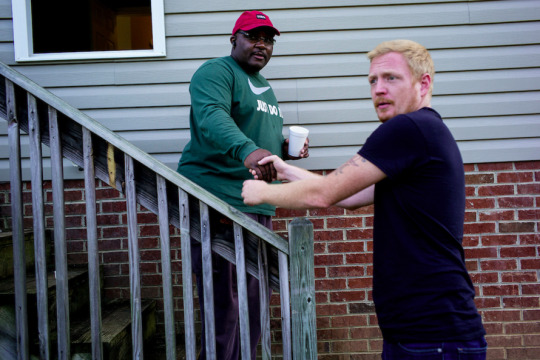
We left Bradley to go see a law enforcement source who I’ve spent countless hours in the past eight months texting and calling. I met him in person for the first time on Monday, and as the sun began to create beautiful golds and oranges across the tobacco fields of North Carolina on Tuesday evening, I said goodbye.
I’m back in Chicago now and Bill is back in Gowanus, Brooklyn. But parts of both of us—even after a long week of hotels and fast food and constant movement—wish we were still out there. And if we had a stiffer spines in us we’d be spending the dwindling resources of journalism, perhaps at the beginning of its final days, talking to the Bradley Humphries all around us, instead of slouching at our desks in big cities.
Maybe, the people whose stories we are entrusted with telling, stories that can clarify the truth that we all want the same things—security, prosperity, love, friendship, peace—would respect us more if we just spent more time with them.
1 note
·
View note
Text
The cleanse, then movement
Change is coming.
For the past eight months I’ve been on the road with stints in Chicago and Peoria to hold me down. My car tells a bit of this story. There are a dozen water and Gatorade bottles and Diet Coke cans. Empty fast food bags and napkins strewn all over the floor. Two road atlases, a few state maps, a shotgun shell found on a rural Illinois road, a business card from a karaoke DJ, receipts from Waffle Houses, White Castles and McDonald’s across the Midwest, and other freelance detritus.
“Are you a good person?” a CD reads. It is found under the pile of of bottles and trash on the floor of the backseat, forgotten until now.
I have no idea where this is from or what prophet gave it to me, but on my trip back to Chicago tomorrow I will listen to it and see if I am a good person. The CD, I’m told by its cover, will give me Reasons to Believe the Bible; an accompanying pamphlet says there are 33 of them. There are fulfilled prophecies, archaeological finds—among them, the Tablets of Ebla—and More Truths From the Bible.
Perhaps tomorrow will change me greatly.
A story I’ve been working on for 11 months—on and off, of course; working almost entirely on my own doesn’t allow me to ever fully concentrate on any one thing—ran today. Frankly, it did not reach the amount of readers I was hoping for.
The Justice Department released a report on one of its many data collection programs last October. That’s when I got wind of it, and without going into a long and boring rant about why it didn’t run sooner, I’ll say that if I worked in-house at a publication, today’s story on the failed Arrest Related Death program would have run last year.
And it would have been much bigger.
In journalism there is an ongoing debate that pits access against accountability. To get access to a presidential candidate, for instance, you can’t be overly tough with them and you can’t, I suppose, constantly call them a Child King.
In my world of freelancing, problems with access are many. But in the case of today’s story, the access problem was a journalism problem: the story was, because I discovered the report in the process of working on another story for a publication, tied to that publication. Yet because of the way that publication operates, it was not seen as the scoop that it was.
Instead of trusting my judgment, research, reporting and reading of a federal law, experts and lawmakers would need to be consulted. Much time would be need to be taken. Until eventually, the scoop expired.
It should have been a bombshell. Instead it landed with the thud of a floating feather.
If I were in-house at that publication, the story could have potentially reached a much larger audience, and here is where my particular brand of access problems begin. Being in-house means having access—close physical proximity to editors’ ears and a less intermittent working relationship with them—but it also means a loss of freedom.
I’m lucky to be able to do what I do. I work from home. I make my own schedule. I write the stories that I want to write—the stories that I think are important. All of that can be done from a desk in a newsroom but it costs you.
I learned what that cost was three years ago, the last time I held a full-time newsroom job, when my paychecks were based on hours worked, not stories published. Sometimes, you have to write stories that you think aren’t important and you have to play some politics in order to appease editors and other reporters.
Yes, I realize that everyone who works anywhere makes concessions, but in journalism, it can be particularly distressing at times. For the last year we’ve been watching as a man who is clearly unfit for the office of the president takes over each day’s news cycle. He is doing this because we need clicks, because clicks mean traffic and traffic means ads and ads mean we finally get paid. And each day reporters are putting their names on the first draft of history. If that doesn’t make you anxious—or at least concerned about what you take the time to cover—you haven’t learned journalism’s importance.
If all of this sounds like I’m just another frustrated reporter, it’s because I am. More importantly, I’m frustrated because the Arrest Related Death program is another example of government waste. That’s something that deserves people’s attention, whether you are Democrat or Republican, pro-police or anti-police or somewhere, like many of us, in between.
I am sitting on my parents’ back porch to experience an early autumn wind. There is a distinct difference between a summer breeze and a fall one.
My mobile office is clean, more stories lie waiting in the hopper, and, two years after becoming a full-time freelancer, I am contemplating what needs to change.
1 note
·
View note
Text
If the weather holds
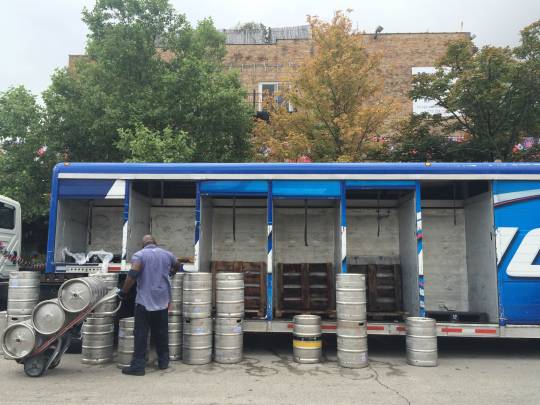
He is taping a yellow sign to the back window of his SUV.
“TICKETS BUY SELL”
It is just after 9 a.m. on this Saturday morning and the preparations are underway.
“$90 and up,” the tickets are going for, he tells me. For $300, you can be 35 rows from the field.
It isn’t always easy to live in this neighborhood for an introvert like myself. But on a cool Saturday as the hangover kings and queens shake off last night on street corners and grab their cabs, this is one of the most beautiful places in the world.
Just in front of the marquee a tour guide is addressing a group of tourists, maybe Cub fans, probably both. A group of men are listening in Cubs shirts that have their own last names on them. A bachelor party perhaps.
The tour guide is explaining how over the years the marquee has been painted green, blue, purple and then, finally, the color the organization has chosen will stick: red.
“So welcome to Wrigley Field, now let’s go.”
And they shuffle inside.
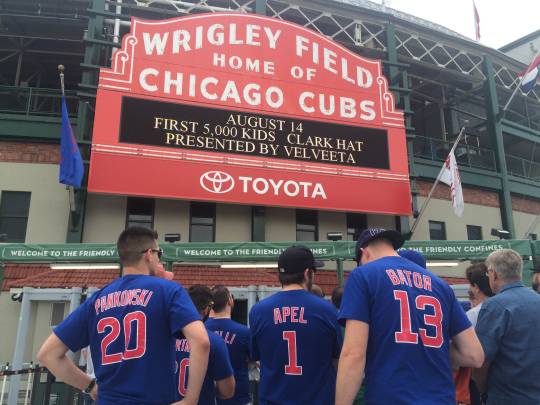
It seems like I’ve been on the road most of this summer after spending a significant portion of the spring haunting Wrigleyville. It was easier then. The weather was colder which meant the lines were shorter, ticket prices cheaper and the hordes of summer boozers were still hibernating from a winter spent inside bars. Now, though, they’re back, and it’s more difficult for me to afford to go to games. (Not that this will likely stop me come playoff time.)
That, combined with the massive crowds of often way too wasted fans has me staying inside for most games. Sometimes I’ll go to Nisei Lounge, the last true dive in the neighborhood, for the final few innings. But as soon as I look out the window and see the crowds passing, I go home.
Like I said, sometimes this neighborhood can be no place for a man who likes quiet, sad bars and solitude. It can be easy to forget, then, that this isn’t just a neighborhood that is sometimes inundated with people who can’t handle their liquor. It is easy to forget that in five minutes on my bike I’m standing in front of the last true baseball cathedral—one that may not be so immaculate after this year if the Cubs win it all. A hotel will be up, condos will rise, and rents for apartments like mine will soon follow on the upward trajectory.
But for now, it’s mine, ours—those of us who won’t be able to afford it once the Cubs are done “Building a Legacy,” as the sign says near the players entrance.
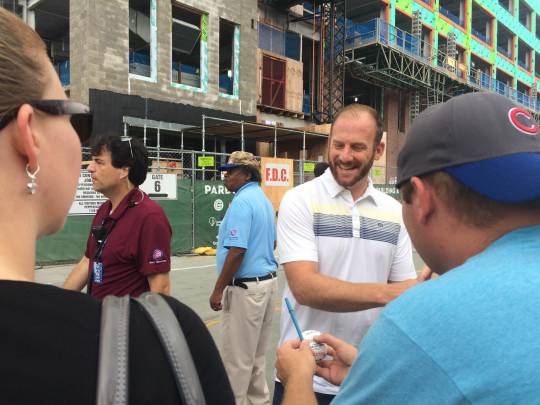
There, the autograph hounds, kids with their dads and out-of-towners gather this morning, every game day morning. A man nearby will say that “Everything’s $10. Ten dollar shirts guys!” He will say that 10,000 times today near the corner of Waveland and Seminary where the players shuffle in and out for their day’s work, just outside the fire station where the firefighters will sit in lawn chairs and watch the crowds go by and .
Former Cubs pitcher turned team ambassador Ryan Dempster signs autographs for everyone in line just before today’s starter Kyle Hendricks shows up in a black Jeep with no gear.
“Good luck today, Kyle! Keep it up buddy!” the autograph hound yells.
Travis Wood walks by looking like someone you’d see at Billy Bob’s Saloon in the Fort Worth Stockyards: black Wranglers, pearl snap shirt, maroon leather cowboy boots. David Ross in shorts and running shoes looking very much like the 38-year-old dad he is with his son and daughter in tow. Arrietta in one of his iron-flat bill hats.

There’s been a mixture of blue skies and rain clouds all morning. If the weather holds and this game goes off, the Cubs have a shot at three in a row against the Cardinals, 12 in a row against their last several opponents, a 15-game lead in the central, and 33 games over .500.
I shouldn’t bitch about the neighborhood so much, should I?
Two boys get autographs from Matt Sczur and run back to show their dad. He asks them if they want to wait for more, they say yes, and he lets the kids stand back in line to fend for themselves. Joe Maddon, in faded black t-shirt, dirty white tennis shoes and everyman scruff walks past. He looks like a guy at your bar drinking a beer and a shot—although we all know he’s a wine man.
He passes without stopping, smiling and waving to the fans. This is game day after all. Maybe sometimes we forget that these aren’t men on baseball cards or within the constructs of our minds but men with jobs to do. Maddon walks by but the kids continue to wait.
I ride my bike in long, arching S shapes down Waveland. The crowds are growing. The sun has come out.

0 notes
Text
Chasing a killer and death: Dispatch from Gary

I am standing on a street corner in Gary, Indiana taking a picture of an abandoned US Post Office when an ice cream truck drives by.
"If you're happy and you know it," is the song that plays from the truck. It fades in that creepy way that sirens and music drop in octave when they travel away from you. I am wearing her Chrome Dreams shirt and my red, 1970's Nike running shoes. The summer sun is finally fading after a hot day spent inside air conditioned government buildings and driving around this busted, dying, ghostly town with the windows down and camera app at the ready.
There is much to photograph. I find an abandoned public housing complex. I find an abandoned school. I find the abandoned post office. I drive down Broadway past all of the abandoned businesses.
This is not the America most people know.
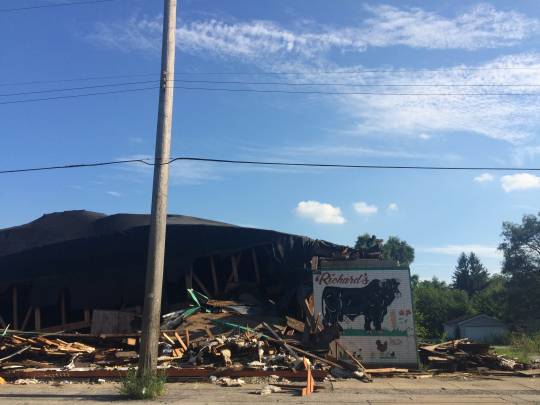
Earlier this afternoon I was riding my bike past Wrigley Field where tens of thousands were beginning to file in for a 1:20 start. I got to my car—parked the neighborhood over because I refuse to pay the permit fee for my own neighborhood—and hopped inside for the first time since I got back to Chicago from the Republican National Convention in Cleveland.
In the middle of the day as people are taking their lunch breaks from their office jobs or blowing off work for a baseball game I am heading toward Gary to fill in the blanks of the case of Darren Deon Vann, a serial killer awaiting trial after his arrest nearly two years ago. Days like today jar me with the recognition that I exist in some sort of dream world surrounded by the real one—I chase what I want to chase and take off in the middle of the day to explore the darker sides of American life. All solitarily.
There are no real weekends or weeknights in my world—I have gotten drunk on Monday afternoons and spent innumerable Saturday hours at my computer. My world is a sometimes disorienting combination of movement, consumption and creation.
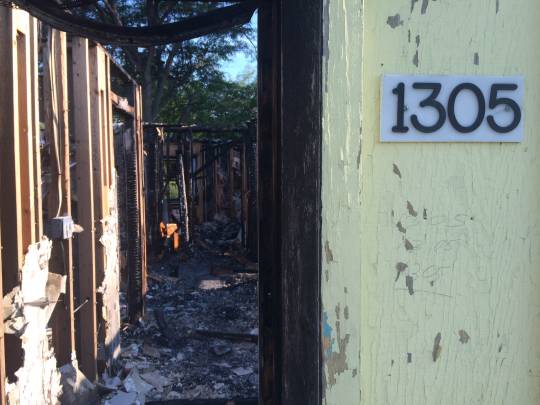
Tonight I am staying in the Motel 6 where Vann murdered his final victim before being caught by the police. Afrikka Hardy was a 19-year-old with a beautiful smile who lived in a dangerous world that took her to places like this—and men like Vann.
When the arranged sex got rough, Vann has told the authorities, Hardy began to fight back. So Vann strangled Hardy with a brown extension cord, placed her in the motel room’s bathtub, and left. When police caught up with Vann he copped to killing Hardy, as well as the murder of Anith Jones, another sex worker, and several others.
Vann then took the cops on a ghastly tour of abandoned homes in Gary and showed them the bodies of his other victims. Now he’s in the jail here waiting for his trial to begin. By the looks of his case file—which I thumbed through today, all four inches of it—the trial won’t be beginning any time soon.
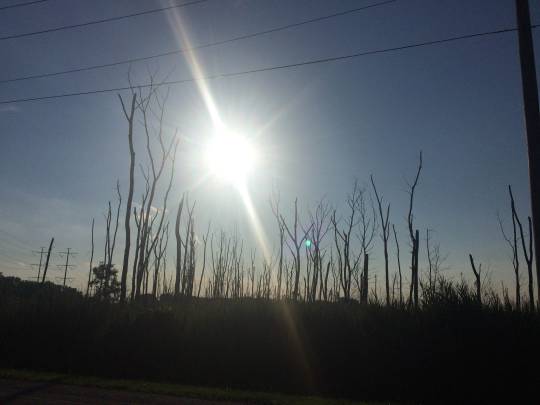
The woman at the front desk of the Motel 6 asks if my reservation is for two adults, an obvious assumption considering this is clearly a haven for prostitution—close enough to the interstate to hear steel belts whining, past an inexplicable field of dead trees and next to a strip club, tonight’s abode is among five hotels within spitting distance of each other. I tell woman at the front desk that it's just me and she for some reason treats me more rudely than the young, high couple in front of me who are most likely getting a room to fuck in.
I wonder why she is photocopying my ID until I see the sign on the wall. "In collaboration with local authorities, this Motel 6 requires a photocopy of guest identification upon check-in."
Did they enact this policy after Vann killed Hardy here or before? I know that at least one person working here knows about the murder. That’s because I called a few weeks ago to see if I could stay in the exact room where Hardy was killed and was told “I will not tell you that and I would ask that you not come on our property, sir.” I know it comes off as ghoulish to request a murder room but is that any worse than staying in it without knowing? The police wouldn’t tell me the room number because they, along with everyone else involved in the case, are under a gag order.
The person I spoke to at the front desk a few weeks ago wouldn’t tell me, I assume, because they just thought it was a dangerously unsettling question to ask.
So I didn’t ask tonight, instead silently taking my key and thanking the woman at the front desk with the name “Bernice” tattooed on her right forearm. Room 113. Of course.
Soon I will go to the riverboat here that was formerly owned by Donald Trump. Then, perhaps, Bugsy's Tavern, the only place I really know in Gary besides the street that Vann used to live on. I don't expect to find anything out of the ordinary there, but I do expect to find someone who will tell me what they think about Vann, Gary and life in an old steel town that is fading fast.
3 notes
·
View notes
Text
Missing the real America from Cleveland
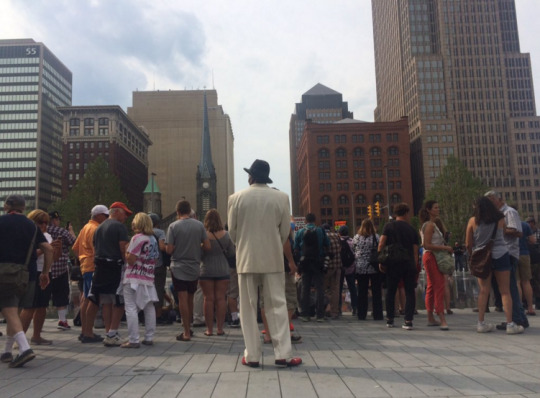
I watched one reporter start running yesterday. That turned into two sprinters, which turned into five. Then 10, 20, 100.
I walked the other way and listened to my police scanner to see if I could figure out what fire they were running toward. Nothing. There was nothing.
The Cleveland public Square could be painted right now by Norman Rockwell and titled “America.” The Republican National Convention has attracted every manner of crazy and unreasonable from across the country: Fundamentalist Christians who spend entire days yelling into megaphones about how we’re all going to hell because gay people exist. Armed rednecks who want everyone around them to know that they have a gun and so should you. Communists, anarchists, racists and every other ist you can imagine. They’re all here and they’re all yelling at each other and not hearing a damn thing.
The ideological polarization that has consumed this country and resulted in a government that can barely function is displayed in miniature by the hour in the Public Square. Try to make sense of it and your brain will begin to misfire, your eyes will cross and you will feel a deep and troubled sleep coming on.
Tonight’s theme at the Republican National Convention is “Make America one again,” a reference to our fractured national psyche that, incredibly and stupidly, the GOP thinks it can repair by throwing its support behind a petulant plutocrat with an unpredictable temper and an ego made of soft glass.
We are not one and never have been. And we never will be. Michael from The Big RedOne who has labelled himself an infidel will never believe Muslims can be patriotic Americans.
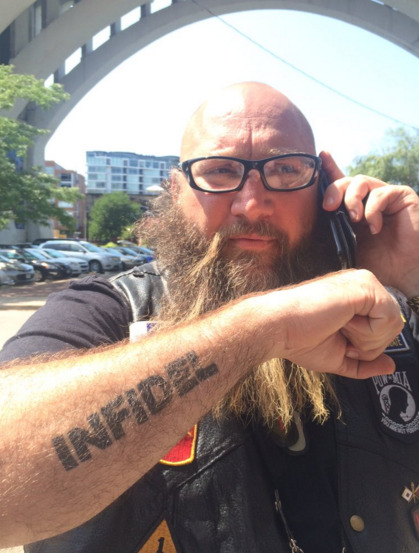
Republicans across from me at Flannery’s on Fourth and Prospect are complaining that the media has made such a stink about Trump’s plagiarizing wife. They have a legitimate bitch; there are many fucked up things about Trump, his toxic inner circle and dangerously uninformed worldview that should be scaring the hell out of all voters regardless of their political leanings.
He is childish. He is dumb. He operates out of outlandish fear and ignorance. He is spiteful and impulsive and spoiled. But he is saying things that people are thinking, which means that we are all of these things as well.
Republicans right now—despite having the most amount of guns and money of any group of people in the country—are the personification of the American electorate in one massively important way: we are scared. Trump is the Big Daddy who will protect us from all of the scary things in our world—or at least give us that security blanket to wrap ourselves in even if it’s full of holes and threadbare.
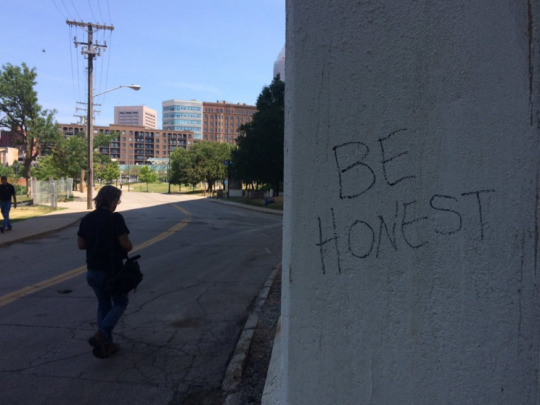
I wrote the other day that Trump is the fuck you, pay me candidate. Perhaps the only better way to put it is that he is the fuck everyone, pay me candidate. ISIS, pussies, Democrats, non-hustlers, Muslims, illegal immigrants, the poor—fuck all of them. And fuck them yesterday; we’ve got to get back to kicking ass, Trump says.
So when Donald Trump takes the stage tonight at his coronation, remember that he is saying fuck you, too. The only thing that matters to Donald Trump is Donald Trump. I don’t even think he really likes America. I think he likes America because it has been good to him. If it wasn’t, you would not hear Trump saying good things about this beautiful, terrifying and complex country.
“Fuck America because it fucked me,” he would say.
Across from me just now, two of the most Republican couples you can imagine are drinking and eating and talking about how exciting everything is. They are taking pictures of Thomas, a singer, nut, man of the road and genuinely good dude from Denver who has shown them a sign reading “I’m just here for the violence.” It is a joke. The find this very entertaining.
Lynyrd Skynyrd’s Simple Man is playing and I am thinking about all of the people out there in the country who have hopes pinned on Trump’s insane strongman promises.
They have gone all in, and when the cards are laid down and we finally see he was playing with a bunk hand it will be some of the neediest among us that will be hurt the most. They are out there, and it’s time to get back among them.
3 notes
·
View notes
Text
Dispatch from Cleveland

I sat yesterday in the Rock ‘n’ Roll Hall of Fame for free WiFi and electricity while men and women with many lanyards went up and down escalators.
Eazy E and Lemmy looked on from a wall to my left.
We are waiting for something to happen in a city where many things, I suppose, are already happening. Delegates are delegating inside the Quicken Loans Arena, where Donald Trump introduced his plagiarizing wife the other night to much applause. Anticipation? Not sure. Nothing against Melania Trump but I think you’d be hard-pressed to find anyone whose hearts were pumping more quickly because she would soon the stage.
We are waiting to see if the activists and protesters here will actually make a play for the news cycle and take the attention away from the bizarre plutocratic spectacle taking place for the TV cameras inside the arena.
I want to be outside when that happens because that’s where the people are.
It is day three and it feels like day 10.
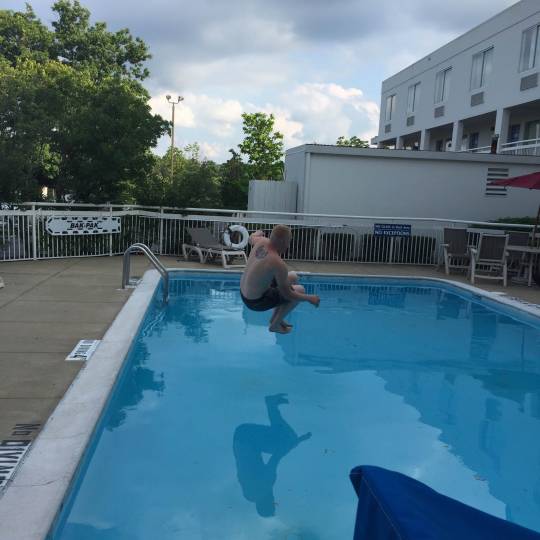
Bill Kotsatos is with me after spending two weeks on the road with Jim and Lorraine, a trucker couple who are all in for Trump. His documentation provides an incredible view into their world. The four of us have been hanging out here and there as Bill and I monitor protests.
They left today and are upset over my story that they feel paints them as racists. I think I was able to explain to Jim this morning that that’s not what I intended and that I was simply trying to be honest and raw and explain to people that they live difficult lives. They are hard-working and opinionated and there’s nothing wrong with that. Jim called me his brother throughout our phone call as he does with nearly everyone.
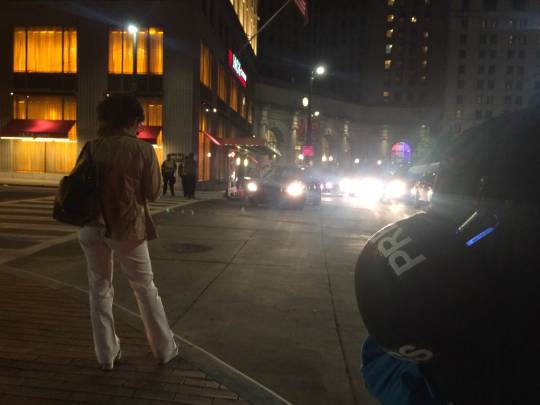
There was a brief flash yesterday about shots being fired on a police vehicle that turned out to be only a rumor. Another rumor going around is that activists will mobilize in large numbers today and tomorrow. Right now I can tell you that everything seems quiet and chill and boring. The looks of boredom on every cop’s face tell the story, for the moment.
This isn’t the apocalypse that everyone expected—at least not yet.
I don’t hope for violence but I hope someone does something. I hope activists do mobilize in large numbers to voice their concerns that Donald Trump is a very dangerous person to put into the White House, and that this country’s most powerful people are making a grave mistake by putting so much power in the hands of someone who I’m not sure could pass a basic civics test. Until then, we wait.
0 notes
Text
Old cases and new findings
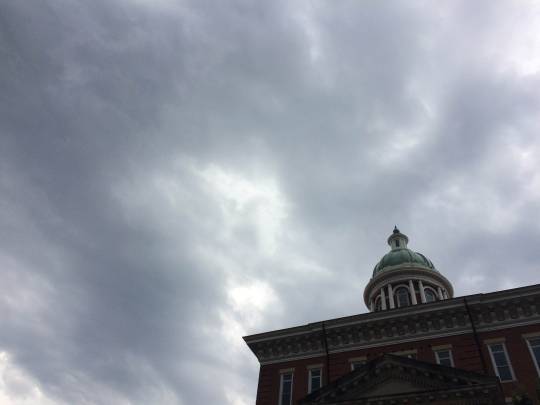
Driving through Ferguson the other day, there was no way to describe it as anything other than surreal. I was in St. Louis and nearby Alton, Ill. working on a story about the death of the American off-track betting parlor, and travelling with a friend who had never been to Ferguson presented me with the opportunity to pass through and explain what I had seen. It was the first time I have been to the city while not covering something related to Mike Brown.
Along North and West Florissant streets, where I have spent more than a month’s worth of time over the past two years chasing stories and running from tear gas, the weight of what happened there immediately came to the forefront of my mind. Situations like what happened Ferguson demand our attention because of their rareness—mass civil unrest occurs far less in this country than it does elsewhere. And what makes those riotous environments so fascinating is what they represent: the complete breakdown of the rules we have created for our society to operate under.
They are rules, Shannon reminded me, that are human constructs, and in moments of public disorder we see that they are as fragile as the men and women who have crafted them.
Without a tour guide, it would be nearly impossible to tell that something as chaotic and enormous as the Mike Brown case happened in Ferguson, which was going about its business on a sleepy Thursday afternoon. Save the shells of a few buildings that were torched in the aftermath of the grand jury’s decision not to indict the cop who killed Brown, one would be hard-pressed to tell Ferguson apart from any other Midwestern, strip mall suburb.
And that’s what makes the chaos that enveloped the city so engrossing. Ferguson could be anywhere, at any time, under the right circumstances. The fragility of social order is what, more than anything, Ferguson proved.
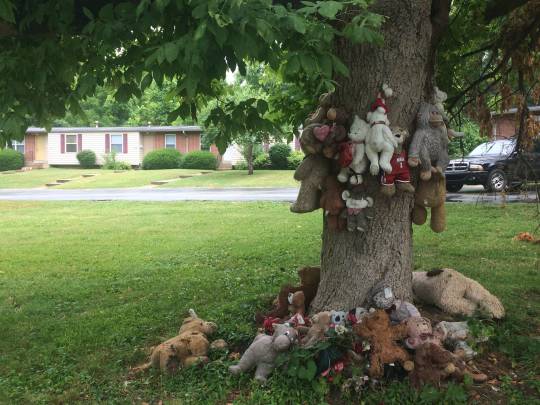
We drove down Canfield only to find the memorial for Mike Brown no longer there. A bit further down the road, we found that the memorial for DeAndre Joshua, executed on the night of the grand jury decision, remains. At the Delwood Lounge, the eyes of someone who had seen Ferguson riot could tell you what the scene there on Thursday could not. Older men quietly drank their beers and watched TV as I retold the story of my last time there, remembering the clicking of an assault rifle, and the threat of the walls coming down from enraged forces outside.
“So, what, it’s just back to normal now?” Shannon asked of the once world-famous city.
“I guess so,” I said. “As much as it can be.”

Meanwhile, a strange and sad case of death and child traumatization was playing out in my former home of Bemidji. When the story first broke the texts began coming in: “Jacob Kinn. Remember him?”
I had forgotten.
Kinn was busted in a child porn sting when I was a reporter at the Bemidji Pioneer. Back then, he was out on probation for a separate child porn charge when the cops nailed him for using Craigslist to lure little girls to his home for perverted photo shoots.
So, it was a frustrating moment when I learned that Kinn had been released from prison early on that case, and was free instead of being locked up when he kidnapped a little girl a few weeks ago, binding her legs and leaving her in a trailer in desolate Big Fork, Minn. Now, police are looking at Kinn for the murder of a woman the little girl had been staying with, a love interest he may have bound and left for dead after torching her trailer home.
She was found, still tied, under a mattress when firefighters entered the home.
I’m sure my anger that an obvious predator was let back out into society represents just a fraction of the frustrations of law enforcement, who worked dutifully to protect their community when they succeeded in putting Kinn behind bars three years ago.
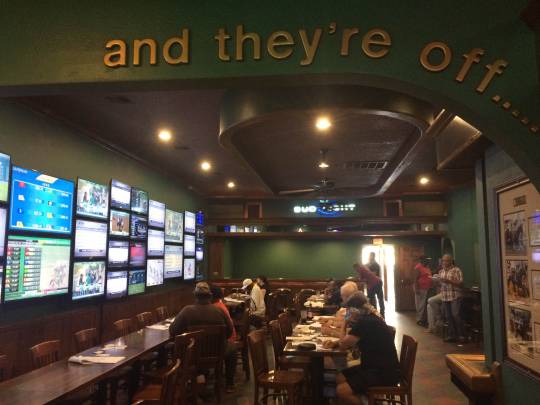
Kinn’s case is a reminder that police have a difficult job, and right now there is no more vexing place for law enforcement work than Chicago.
I dove into the Chicago Data Portal earlier this week looking for some old cases I’m tracking. The portal is a fantastic tool for studying a wealth of statistics on crime in the city. It’s a bit non-user friendly but with some practice one can get around pretty easily.
It wasn’t long until I came across a way to separate homicides for which there are arrests from those that have none.
As of this afternoon, there have been 7,733 homicides since Jan. 1, 2001 in Chicago. In 3,888 of those cases police have not made an arrest. That’s a clearance rate just around half (you can do the math for yourself) which really isn’t too terrible considering the massive quantity of killings and the no-snitch culture of Chicago.
Still, that’s a lot of bodies, and a lot of families who may never know who killed their loved ones.
0 notes
Text
On Trump, the media, and our abusive relationship
I was recently among many journalists who was asked to participate in a survey for a future New York Magazine piece. It was described to me as a “vast critique of the American press.” I’m not sure if members of the Fourth Estate are the best people to provide that criticism, considering no one likes talking about their own problems and most have difficulty doing so honestly. But maybe I’m wrong.
It was a helpful exercise in that it forced me to consider some of the things that got us to this point, and by this point I mean the near total failure of the media to prevent a terrifyingly ignorant plutocrat from coming this close to taking over the most powerful position in the world. (I have included two of my responses from the survey with their accompanying questions. The first is below.)
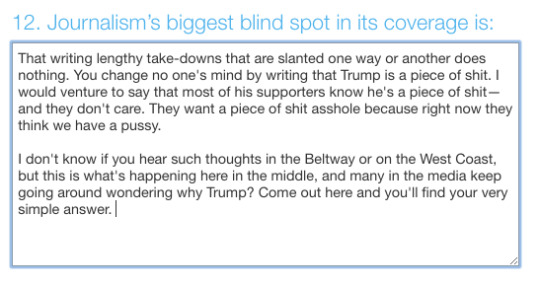
If you think that it is not the media’s role to act in a protective and preventative way, that we are instead tasked only to observe, report and let the voters decide, then that is simply another unsettling aspect of the media’s troubled relationship with the American people.
We are supposed to be here to stop people like Donald Trump, not placate him. When a sitting president said that a crime committed by the president cannot be a crime because he committed it, we were there to ensure that such lawlessness would not continue.
And now? The opposite. Consider the strangeness of this sentence: Journalists are just now fact-checking Trump in interviews as he lies live on television to the entire country.
And we are praising ourselves for it, stupidly. But why now? Why not almost exactly a year ago when he cartoonishly rode down an escalator to announce he was running for president and made the entirely untrue and grossly offensive claim that Mexico was actively choosing to send rapists to our country? By saying “Mexico” Trump was implying that this was an action of government, which is technically libel. (In a maddening bit of irony, Trump has threatened to expand libel laws so he can more easily sue media outlets who report anything about him he doesn’t like, which is essentially everything that is true.)
Following his outrageous claim, some reporters, I assume, asked Trump if he had any evidence to support the assertion that a foreign government has been rounding up rapists by the thousands and forcing them over the border.
It should have ended there. But instead, we sold our souls. In March, the New York Times reported that Trump had received nearly $2 billion in free media, including massive quantities of television airtime. Entire speeches, for Christ’s sake, that were nothing more than him rambling about his ideas that have no basis in practical application, and talking about half-truths he hears that somehow transform into fact in his mind. (In May, MarketWatch reported that Trump’s free media haul was worth $3 billion.)
But there is a reason we give Trump so much. Journalists, generally speaking, are poor, tired and overworked—the personification of the companies we work for. Trump, then, is practically a godsend. He provides money (in advertising dollars when stories go viral, which they always do) and easy copy—it takes virtually no brain power to write 500 words on what Trump tweeted on any particular day.

Our task is endless. We fill newspaper pages and put stories on websites every day because audiences demand it, and the news cycle requires updates, opinions and follow-ups on those stories at ever-increasing speeds. Trump is news, put very simply, so it’s not as if we can just ignore him.
But that is precisely what Ted Gup over at The Nation proposed today when he wrote that news organizations should immediately boycott Trump events to take away the massive audiences we freely—and irresponsibly—give him each day (which I know I’m also guilty of right now). Gup opines that this would not only be a show of solidarity with The Washington Post, whose reporters have been banned from covering Trump’s rallies and press conferences, it would be a strong statement to Trump that the press still wields great power, and that we are not afraid to use it. Says Gup:
A mass boycott would signal to Trump that he must respect the role of the press. It would signal to those journalists who have been targeted that we recognize their plight as our own. And it would signal to the nation at large that we are not the craven, mendacious institution that Trump says we are.
My immediate thought: Hell yes. That is, if I’m an editor at the New York Times, I am taking Gup’s boycott proposal into serious consideration. It is bold. It is noble. It may be a very necessary stand to make if we want to reduce the amount of coverage we are giving to a man who is clearly unfit for office—from your local city council on up. But I am not an editor at the New York Times, I am a freelancer. This means that the moment the boycott is put into place, I immediately make plans to attend the next Trump rally and write about it for the highest bidder.
We eat ourselves. Journalism is an ouroboros that will always find new ways to fuck itself over or feed on the failure of others. This failure just so happens to be systemic.
What can be done, you ask? I freely tell you I have no idea. What I do know is that a Trump presidency would be so historically disastrous that future scholars are sure to look back and pinpoint the failure of journalism to properly fund itself, which is the root cause of our disgusting relationship with Trump, as the beginning of a cycle that ended with the demise of the Republic as we know it.
That is entirely on us.
0 notes
Text
Preparing for Unrest: A reporter’s guide. Plus Thoughts on the Release of the Laquan McDonald Death video.
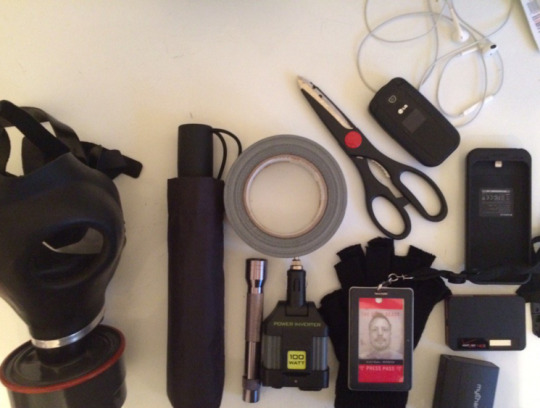
I’ve learned a lot since my first trip to Ferguson when, after a three-hour drive, I found myself smack-dab in the middle of a riot.
At first I was wholly unprepared, but by the time the grand jury decision came down a year ago this week, I was quite the opposite.
A reporter’s instinct kicked in that first night last August and I moved toward a group of people throwing rocks at a line of cops, wading into tear gas smoke that stung our eyes. For many activists and journalists it was their first time in a conflict zone. I’m in that group, and the logistics of reporting in that environment taught me a few things that every person who decides to walk toward chaos and not away should know.
Obtain/buy:
Waterproof backpack and raincoat
Flashlight, knife, duct tape
Fingerless gloves for texting and tweeting
Phone case charger and backup charger box with accompanying cables, as well as as many charger jacks as you can get for cigarette lighter in car
Power inverter
Aircard
Snacks and bottled water (I had to go as much as 12 hours without eating; everything closes down in a riot)
Gas mask, usually about $30-40 at army surplus stores or ordering online. Some people like to wear helmets and flak jackets but I think they make me look too much like a cop. If you do go that route make sure you paint PRESS in white on the vest and helmet. You can also buy packets of this milky fluid that helps your eyes after you get gas, pepper spray or pepper balls in them. Regular old milk works too.
Hiking boots
Police Radio iPhone app. It costs $1.99 and has more frequencies than the free 5-0 Radio.
Burner phone in case you get mugged, lose it, whatever
Bring:
Everything above in your backpack every time you leave your car
Cash in your wallet in case you get mugged and can hand it over to appease the mugger. Leave one credit card in the car and stash another one in the most hidden compartment in your backpack there is.
Headphones so you can listen to scanner traffic and know what police and protester movements are. This allows you to have ears without anyone knowing -- some folks who hear scanner traffic automatically assume you're an undercover cop, which is about the last thing you want in a riot scenario.
A card with emergency numbers (since none of us memorize them anymore) and numbers of editors and friends should your phone get lost or stolen or you somehow get arrested.
Press pass, but only use it when protesters or police ask for ID. Walking around with it hanging from your neck is just asking for trouble, in my opinion.
Do:
Park in places that are visible and well-lit but not too visible and well-lit. Park at least a block or so away from scene.
Give editors, friends, family updates when your position changes. Or, if you're keeping up with tweeting, just tell them to follow you there. Situational awareness is important.
Much of this stuff is common sense, but apparently I didn’t have a whole hell of a lot of that when I jumped out of my car on West Florissant for the first time. But I do now, and as Chicago braces for demonstrations following the release of the Laquan McDonald death video, I am as prepared as anyone can be, and that will make me sleep easier tonight.
Police and activists are preparing as well. And city leaders and politicians are trying to determine when it is best to release a disturbing video that shows the violent and brutal end of a young man’s life.
There is endless speculation here not only when, where and how the city will release the video, but what the reaction will be. Demonstrations? Surely. Unrest? Depends on how bad the video is, how police respond to protesters and how active agitators among protesters are, what the weather is like and a million other factors that are impossible to gauge.
Riots? I think, unfortunately, yes.
The waiting game everyone is playing is the same one we played during this week last year, when media and activists again rolled into Ferguson in anticipation of the grand jury announcement. Thinking it was imminent the night I arrived, I learned another thing: When and how the government decides to release information is highly unpredictable.
It took another four days before the announcement was made, and it was enough to cause the rage that prompted flames. If the video showing McDonald’s awful demise is as bad as police and attorneys tell me it is, I think parts of Chicago can expect the same, and possibly even worse.
0 notes
Text
Illinois AG to Chicago police: release Laquan McDonald death video
The Associated Press erroneously reported that the Illinois Attorney General ruled today that the Chicago Police Department should release dash cam video depicting the death of 17-year-old Laquan McDonald.
I initially implicated the Chicago Tribune in this error but it turns out they got it right: the AG’s request for the release of the video was sent to CPD on Nov. 6. Why it’s just coming out now is anyone’s guess, a spokesperson from the attorney general’s office told me this afternoon.
It might have to do with the fact that a Cook County judge will rule tomorrow whether CPD must release the video, a decision that will likely be immediately appealed, tying up the issue for at least another few months.
In its request--which came in the form of a letter in response to a Wall Street Journal reporter who had FOIA’d the video from CPD--the AG’s office says the department failed to provide adequate reasoning as to how the video’s release would affect any of the investigations into the shooting.
The feds have been conducting a probe alongside the Independent Police Review Authority, which investigates all officer-involved shootings and claims of police misconduct. McDonald was shot 16 times by a single officer and died as a result in late October of last year.
Tomorrow’s decision comes as a result of another FOIA denial from CPD, filed by independent journalist Brandon Smith.
When Smith’s request for the video was denied in May, he chose to sue CPD instead of appealing to the AG--which often leads to months of waiting only to receive a letter requesting whatever agency you filed a FOIA with release the information you asked for.
That’s the case with the Nov. 6 request, which obviously doesn’t legally require CPD to comply. But tomorrow’s ruling will, and regardless of the outcome activists and journalists alike not just in Chicago but across the country will be watching.
You can read the full letter, provided to me by the attorney general’s office, below.
Illinois AG letter requesting Chicago police release Laquan McDonald death video
0 notes
Text
The Clincher
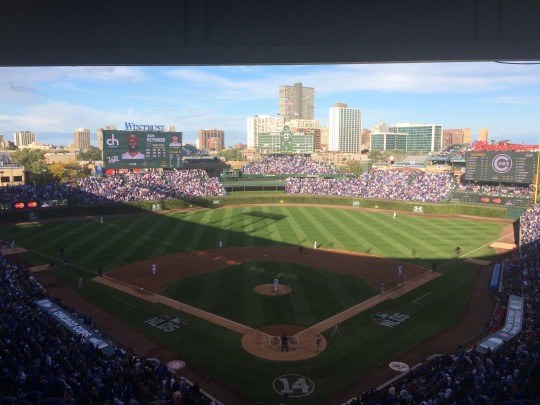
The scalper says the ticket is $200. I groan and mumble something about how that’s too much for me.
“How much you looking to spend?” the scalper asks.
I tell him my price.
“Alright man I’ll help you out.”
A nervous cigarette later and I’m inside Wrigley Field, standing in line at the ATM with about a dozen other fans, straining my neck toward the nearest TV screen to see what would come of Javier Baez’s second inning at-bat. From my vantage point I could only report a few things: It was hit hard and long. It was headed into the sun and toward a mess of jumping and screaming fans in the bleachers. Baez’s slow trot—barely visible on the far-off screen—served as final confirmation: That ball was gone.
The Baez bomb was just the beginning of a long and joyous game at Wrigley Field on Tuesday night. And it may mark the start of something very special should the Cubs be able to do what hasn’t happened since—well, you know how damn long it’s been.
At the ATM line, a man jokes that we should all meet there at the bottom of every inning. This, the thinking goes, will ensure that more offense will ensue if we simply carry out this superstitious practice.
Few things better capture the psychosis of Cub fans than the odd practices we perform in an attempt to please cosmic forces who are inexplicably tied to the success of our team. I wore the same outfit after the Cubs won the Wild Card Game in Pittsburgh. When it failed to bring victory when the team travelled to St. Louis for Game 1 of the NLDS I decided to switch it up.
Superstition has long been a part of baseball. But the Cubs’ brand of it seems to be more potent than with other teams.
***

Up the steep stairs of Section 516 is my seat in Row 9. Here is where you can look west and slightly south through the chain link fence that keeps you from tumbling a few stories down to the sidewalk below. You have to lean to your right if you’re sitting in Seat 6 if you want to see the pitcher—a metal beam supporting the roof blocks hurlers from view.
This is where the scorekeepers are. The headphone-wearers listening to Pat and Ron call the game on the radio—just like Pat and the other Ron did before hero Santo passed away. This is where you can sneak a smoke and not worry about someone complaining. If Wrigley were taller Section 516 would be called the nosebleeds. The bros who replaced the Bleacher Bums aren’t here. The cute girls taking selfies no matter what is happening on the field are much closer to the action, dozens of rows below the die-hards in the cheap seats along the chain link with the wind coming in, chilling them before anyone else knows the temperature is about to drop.
This is the place you want to be if you love the Cubs. This is where baseball is watched and worried over, where there is constant celebration because we have the privilege of going to a game on a Tuesday afternoon and brief anguish when it doesn’t turn out in our favor—which for the better part of the last decade and the 10 or so that preceded it has been the case.
Jason Hammel only makes it three innings. Maddon empties the bullpen in a pull-out-all-the-stops move that has my dad asking, “How many pitchers do the Cubs have?”

In comes Justin Grimm throwing straight smoke. Travis Wood lets in a run to bring the Cardinals within one. Trevor Cahill follows and almost strands two before giving up the game-tying fourth run for the Birds.
Section 516 Row 9 has a new addition now. Some chubby guy in sweatpants and a worn game hat. The 50-something in Row 8 who stands the entire game is giving the new guy shit.
“You gotta bring some mojo, man!” he says. “You show up late and now we’re losing!”
The new guy snaps something back, obviously perturbed.
“Hey, we’re all trying to be nice,” a friend of Row 8’s Standing Man says.
“He’s not being nice so why should I be nice?” Sweatpants in Row 9 hurls down a few feet.
And then, Rizzo. At blue-grey dusk with with a shot to the same jumping right field bleachers where Baez put his go-ahead homer in the second.
Sweatpants and Standing Man are high-fiving now. All is forgiven. Rows 8 and 9 in Section 516 at 1060 W. Addison have reconciled, and are now overjoyed with their new, shiny, one-run lead.
***

The Cardinals get out of the 6th without any more damage. The sun is setting now. I make it to the bathroom and grab two beers on the patio just above the marquee that will soon tell everyone who didn’t already know, “Cubs Win!” I’m back at my seat in time to see Fernando Rodney and his twisted cap falling to the first-base side of the mound after a violent toss toward home. He pumps his fist to the crowd following the K.
We sing the stretch, buzzed and screaming along with the ghost of Harry Caray on the new video screen in left. Then Clayton Richard and Pedro Strop. And Hector Rondon closes the door.
I stick around for the celebration and the encore of Go Cubs Go, written by another fan who left this world before his team could takes its Series. The Cubs have clinched. Wrigley slowly empties and I realize that I haven’t eaten in hours and have been standing for the last three. I file out into the street with a thousand others and realize I’m too tired to do much more celebrating.
The Cubs took it out of me. The game was exhausting. This team is a commitment of the mind, body and soul.
My team is in New York now, where in 1969 many other Bad Things or Cubbie Occurrences of Evidence of The Curse were seen that year. But Shea Stadium has been reduced to dust. That cat is long dead. And Ron Santo stands in the on-deck circle no more.
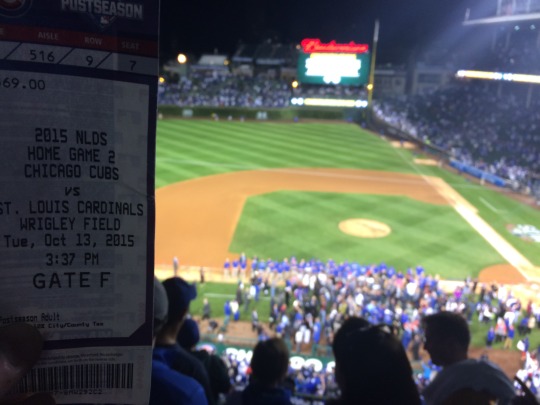
1 note
·
View note
Text
Dispatch from Madison
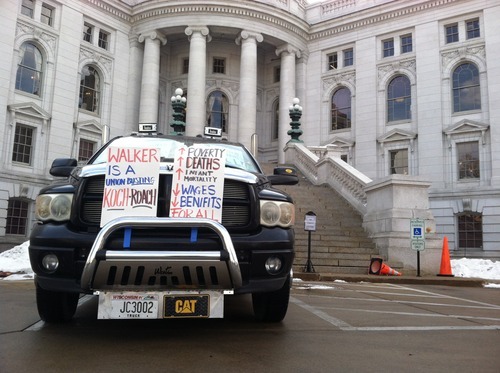
The hearing on Wisconsin’s right to work bill ended a bit earlier than expected today, with Republican state Sen. Stephen Nass citing a “credible threat” that the proceedings would be disrupted.
Protesters have been here all day, occupying the Capitol rotunda and holding a rally on the steps outside. They may come back in greater numbers tomorrow, when the Senate is expected to vote on the bill — a rush job borne of the fact that this is an “extraordinary session” of the legislature, Democratic state Rep. Diane Hesselbein said.
I ran into Hesselbein, a staunch opponent of right to work, while entering the Capitol this afternoon. Yesterday I described the chances of defeating right to work here as dismal, but that was a little premature. They’re really dismal. That’s because the bill is expected to pass easily when it reaches the Senate floor tomorrow, and a 63-36 Republican majority in the State Assembly represents the greenest of lights there.
“If we can’t stop it in the Senate, it’s pretty much over,” Hesselbein told me.
The state representative with the “really German” last name was in and out of today’s hearing, as were a lot of other people. The line was long to sign up for testimony in front of the committee, and many people opted to simply fill out a form representing their position on the bill.
I spoke to a Catholic priest writing down his thoughts on the form. Father James Murphy was at the Capitol today to express what he said was the church’s position in favor of worker rights. He said the efforts to introduce right to work in Wisconsin were akin to anarchy: Workers are allowed to vote for union representation, he said, and this right to work bill basically supersedes those fought-for decisions.
“What (Republican legislators) are doing is — after you make a democratic decision for union representation — they’re saying ‘You can do whatever you want.’
“It’s anarchism,” Murphy said. “I think that’s an appropriate word to use here.”
I didn’t see many clergy members other than Murphy today. The overwhelming majority of the crowd was made up of union members in hard hats and clothes more suited for construction sites than the Capitol building. A small group of protesters unfurled a Black Lives Matter banner this afternoon, and a chant that I first heard in Ferguson echoed through the Capitol rotunda after the hearing’s vote:
“No justice, no peace!”
Murphy and others see today and tomorrow as an opportunity to fight for just working conditions and, to a larger extent, to put themselves on the right side of history. The Republicans, for their part, claim right to work will bring jobs to the state and boost its economy, just as they say is the case in neighboring Michigan and Indiana. They’re backed by manufacturing and corporate interests, and constructed their bill with the help of the American Legislative Exchange Council, so you can hardly call this a movement of the people. In fact, I didn’t see any right to work advocates among today’s crowds. And I couldn’t help noting that those who have gotten the historical shaft are usually the ones chanting and protesting outside the halls of government, not deciding policy within.
It’s safe to say Murphy would agree with that observation.
“[The Catholic Church] has a long tradition of supporting workers,” he told me. “But the problem is that, since about the 1960s, many Catholics have become the haves, and not the have-nots. I’m here today to remind legislators where the church stands.”
Like his union allies, Murphy by tomorrow will likely be standing on the losing side of history.
0 notes